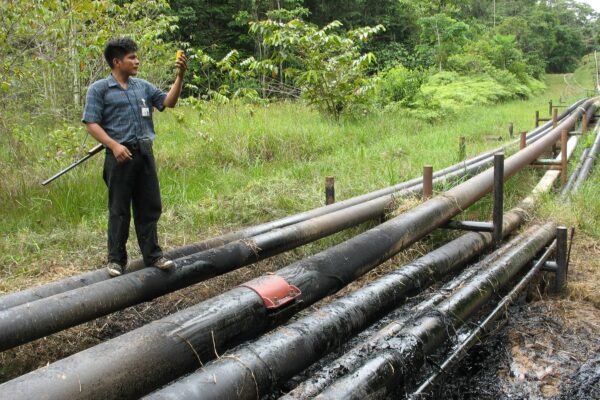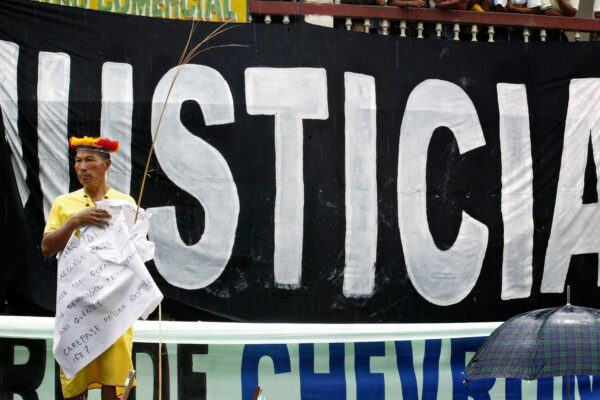Washington — The federal government Tuesday agreed to provide $200 million worth of loan guarantees to an Enron Corp.-led group to help fund construction of a controversial, natural gas pipeline that will cut through a tropical forest in Bolivia.
The Overseas Private Investment Corp., a federal agency set up to encourage U.S. companies to do business in developing nations, voted—over the objections of environmentalists—to help build an 18-inch, 390-mile-long pipeline to deliver natural gas from Bolivia o western Brazil.
The $570 million project also includes construction of a 480-megawatt power plant in the city of Cuiabá, in the western Brazilian state of Mato Grosso do Sul. That facility will be the first gas-fired power plant built in Brazil.
Besides Houston-based Enron, the partners in the project are Shell International Gas, the employees of the Bolivian state-owned oil company and a Bolivian pension fund.
“We are very pleased that OPIC has voted in favor of the Cuiabá project,” said Enron spokeswoman Kelly Kimberly. “This project creates many economic development benefits to Bolivia and for the region overall.”
However, the pipeline will cut through Bolivia’s Chiquitano Tropical Dry Forest, a semi-deciduous woodland distinguished from rain forests on the continent by the amount of rainfall it receives.
Chiquitano, environmentalists say, is the largest, intact dry forest left in the world. And it stands to suffer irreparable harm, not only from the construction work but from the greater access the pipeline right of way will provide to loggers, poachers and colonists, argues Atossa Soltani, executive director of the Malibu, Calif.-based Amazon Watch.
“Where is OPIC going to be in five years after this road … is now in use,” she asked.
The agency’s decision to support the project after a year’s worth of discussions turned on the question of whether Chiquitano constitutes what is known as a “primary” or pristine forest. The Clinton administration has vowed not to support projects in the world that damage primary forests.
The Overseas Private Investment Corp. hired 25 independent scientists to examine the route and propose plans to mitigate the environmental damage. Agency staffers concluded that, because of existing roads and evidence of past logging operations in the region,the affected territory did not meet the definition of a primary forest.
The agency did require the partners to reroute about 60 miles of the pipeline to protect some of the more environmentally sensitive portions of the forest—particularly mountain ridges—as well as wetlands areas.
Government officials also required the partners to study an alternative route proposed by the environmental groups. That route would have affected an additional 16 communities and another 15,000 people, agency officials said.
Enron and its partners, for their part, have negotiated with 29 communities along the route in Bolivia to come to terms with them on compensation for the project. And they have pledged to provide $20 million over a 15-year period for a conservation program for the area.
Agency officials also argued that by providing natural gas to the region, the project will enable other Brazilian power plants to switch from diesel fuel to cleaner-burning natural gas, reducing carbon dioxide emissions by 475,000 tons a year. The project also will reduce the local population’s need for firewood, and thus, help cut down on deforestation.
In an effort to ease environmentalists’ concerns, the agency board Tuesday did require some additional environmental safeguards, including an independent audit to ensure compliance with environmental requirements and environmental training for workers.
But Jonathan Sohn, international policy analyst for Friends of the Earth in Washington, called the last-minute requirements “a bit of green-washing by OPIC.”
Environmentalists argue the decision to help fund the project undercuts the Clinton administration’s efforts to persuade other industrialized nations to adhere to environmental standards when helping fund projects overseas.
“It sends a message worldwide that (the United States’) leadership is hollow,” said Doug Norlen, policy director for the Pacific Environment and Resources Center in Washington.
Besides the environmental activists, the project had been opposed by a group of 25 mostly liberal, environmentally conscious lawmakers on Capitol Hill. The lone Texan in the group was Republican Ron Paul of Surfside.
“Big business is in cahoots with government on this one,” Paul said.
“Government wants to subsidize the attack on the environment.”













